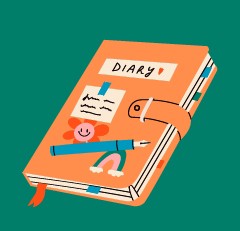On the 15th of each month, we are inviting those working in the field of learning development to share their day. Write up what you have done on the 15th of the month (or your nearest working day to this date) (plus reflections) and share it with us via this short submission form. The entries will be shared here on the ALDinHE blog.
In 2010-11 and 2014-15, the ALDinHE website was previously used for a collective online journal by members of the LD community. The collective journal re-launched on the 15 May 2023. You can read the journal entries for each month. The shared experiences and ideas have helped shape CPD resources developed for new and experienced staff, and to identify other areas for future work.
A reminder will go out on the LDHEN list on the 15th of each month. Share your day by completing the short submission form for it to be added to the ALDinHE blog.

Robert Ping-Nan Chang – University of the Arts London
I finally managed to do co-teaching with a librarian 🙂 Over the last few years at two different
institutions, I had initiated several conversations with subject librarians about any possibility of
collaboration, and unfortunately, they all stopped at ‘discussions’. While there were occasional
opportunities for me to do a session following a librarian’s, the level of collaboration had been quite
low. That is to say, they were doing their thing and left, and then I was doing mine, with little
communication taking place in advance. The LD@3 by Kate Swinton, Lorraine-Marie James and
Gillian Siddall on 24 October 2023 about the University of Northampton experience rekindled my
intention to actively pursue teaching collaboration with librarians, and it worked this time. The
subject librarian and I worked on academic support sessions with two courses about referencing,
which in my opinion is a great topic for both learning developers and librarians to explore together
with students. She focused on the referencing convention (Cite Them Right Harvard and our internal
visual referencing guide) and identifying bibliography information in different kinds of sources (this is
what many students are struggling with, especially given myriad of resources outside the library they
are consulting), and I attended to writing techniques to integrate sources in an assignment, such as
quoting, paraphrasing, and summarising. We learned from each other in the process of planning the
sessions and developing the material. For example, her suggestions helped me improve the clarity of
my PPT design and reconsider certain in-session activities, while she learned from me about
different forms of citations and ways of referencing generated AI. Reflecting upon the experience, I
would argue that the success was partly dependent on the personal attributes and professional
context of the librarian, who just started her role to support the courses which I am also working
with and was very enthusiastic about doing something with the students. She also appeared very
efficient and organised, resulting in smooth communications. Secondly, I approached the librarian
with a concrete proposal – when to teach what to whom at where for what purposes. Instead of a
general consultation with a librarian, there was a clear objective for us to pursue even at the first
point of communication. This reminds of the importance of SMART objectives. My university does
not have the ILS (Integrated Learning Support) mechanism as mandated at Northampton, but the
experience served as a great start for me to deepen and expand collaboration with subject
librarians.
